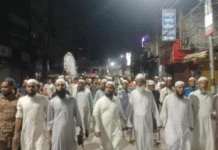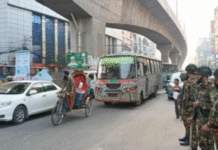
While the world observes International Workers’ Day with speeches, processions, and pledges of solidarity, millions of workers across Bangladesh mark the day not with rest, but amid relentless struggle in pursuit of their daily bread.
May Day, internationally recognised as International Workers’ Day, is observed on 1st May each year to honor the struggles and achievements of workers. In Bangladesh, it is a national holiday marked by political speeches, symbolic rallies, and public events. However, the majority of labourers, especially those in low-income and informal sectors, receive little to no tangible benefits or recognition on this day.
From the early hours of the morning, rickshaw pullers, day labourers, garment workers, street vendors, and construction workers flooded the streets and job sites — not for celebration, but for survival. Despite May Day’s symbolic importance as a day of rest and rights for labourers, many in the informal sector say they simply cannot afford to stop working.
“I know it’s Labour Day, but if I don’t drive my rickshaw today, my family won’t eat,” said Shafiq, a rickshaw puller in Dhaka’s Mirpur area. “No holiday for the poor.”
In industrial zones like Ashulia and Narayanganj, several small garment factories remained in operation. Workers claimed they were asked to report at work or risk losing pay — or worse, their jobs. Labour rights organisations say such practices reflect a persistent gap between labour laws and their enforcement.
Despite significant progress in the labour sector, including wage reforms and increased unionisation, informal workers — who make up over 85% of the total labour force in Bangladesh — remain excluded from many basic protections and benefits.
“May Day should remind us of the dignity of work and the rights of workers,” said Shirin Akhter, a labour rights activist. “But for many in Bangladesh, it remains just another day of toil under economic pressure.”
As rallies and official programmes took place in urban centres, these silent labourers highlighted the stark divide between the ideals of May Day and the realities on the ground.
As Bangladesh joins the global observance of International Workers’ Day, also known as May Day, the stark contrast between celebration and survival remains apparent across the nation. While official ceremonies honour the contributions of the working class, the daily grind continues for millions who have no choice but to labour even on this symbolic day.
From rickshaw pullers in Dhaka to tea garden workers in Sylhet, day labourers, construction hands, and domestic workers resumed their routines as usual, underscoring a harsh reality — for them, a holiday is a luxury they cannot afford.
“I’ve heard of May Day, but hunger doesn’t take holidays,” said Rahima Begum, a domestic worker in the capital’s Mohammadpur area. “If I don’t go to work, I don’t get paid. It’s that simple.”
More work than words
Bangladesh’s labour force is estimated at over 70 million, according to the Bangladesh Bureau of Statistics (BBS), with approximately 85.1% employed in the informal sector. These workers typically lack formal contracts, social security, health benefits, or union representation — making them vulnerable to exploitation and economic instability.
Despite improvements in labour laws, enforcement remains weak. According to a 2024 report by the Centre for Policy Dialogue (CPD), only 11% of informal workers are aware of their basic rights, and less than 3% are part of any labour association or trade union.
Garment workers still struggle
In the ready-made garment (RMG) sector — the country’s largest export earner — conditions have improved since the 2013 Rana Plaza tragedy, but many workers still struggle with low wages and job insecurity.
“I get TK12,500 a month. Rent, food, and everything is expensive now,” said Rina Akter, a sewing operator in Gazipur. “Even if it’s May Day, if I miss a day, I lose Tk 500. That’s food for two days.”
The Minimum Wage Board revised the minimum wage for garment workers in December 2023, raising it by 56% — but labour groups argue it still falls short of living wages.
Hope and Hypocrisy
As government officials and trade unions laid wreaths at the Central Shaheed Minar and organised discussions on labour rights, critics say much of the observance remains symbolic.
“May Day shouldn’t be a day of speeches and banners only,” said Nazrul Islam, general secretary of the Bangladesh Institute of Labour Studies (BILS).
“We must use this day to commit to genuine reform — including social protection for informal workers, stronger labour inspections, and a universal minimum wage policy,” he said.
Until such changes are realised, May Day will continue to be more of a reminder of inequality than a celebration of labour rights — at least for those who keep the country running from the shadows.
Every year we see rallies by trade unions and speeches from leaders, but nothing changes for us,” said Rehana Begum, a garment worker in Gazipur. “We still work overtime without proper pay, and we don’t have the strength to protest.”
Experts point to a lack of awareness among workers and weak unionisation as key reasons for the disconnect. “Many labourers , especially in the informal sector, are not aware of their rights. May Day is symbolic, but without real empowerment, it becomes just another date on the calendar,” said labour rights activist Mahmud Hasan.

 Keep updated, follow The Business Standard’s Google news channel
Keep updated, follow The Business Standard’s Google news channel







